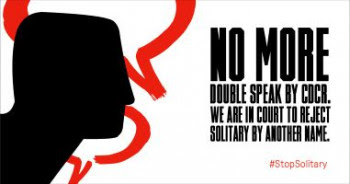Join the Prisoner Hunger Strike Solidarity Coalition (PHSS) for a rally and courtroom presence in opposition to the relentless practice of sleep deprivation torture in CA solitary confinement cells. Please show solidarity with imprisoned civil rights Plaintiff, Jorge Rico, and with people locked in solitary throughout CA suffering severe sleep deprivation due to guards’ loud and disturbing “security/welfare checks.”
Friday, Oct 19, 2018
Robert T. Matsui United States Courthouse, 501 I St., Sacramento, CA 95814
Sacramento Federal Court/Eastern District
Case name and number: Rico v. Beard 2:17-cv-01402-KJM-DB
9:00AM RALLY outside the Courthouse
10:00AM COURTROOM SOLIDARITY with Jorge Rico,
prisoner who brought this case (Crtrm #3, 15th Floor)
After the hearing, Jorge’s attorney, Kate Falkenstien, will be available briefly outside the courthouse to speak with community supporters and media.
Note: You must show ID and pass through a metal detector to get inside the Courthouse.
For rideshare to Sac & other info:
call 510-426-5322 or email phssreachingout@gmail.com
FB EVENT PAGE: https://www.facebook.com/events/811504955847955/
Background
In prison isolation units throughout California, guards jar prisoners EVERY 30 MINUTES with loud and disruptive “security/welfare checks” causing ongoing sleep deprivation.
Every half hour, 24/7 guards subject prisoners to shrill beeping, banging of metal on metal with a Guard One wand, stomping through the pods, talking loudly, and at times, shining flashlights in their faces. The California Department of Corrections and rehabilitation (CDCr) began this Guard One “security/welfare check” system in early 2014 in women’s and men’s prisons under the guise of suicide prevention. In conducting these automated “checks,” the guards aren’t actually checking to see if people are okay; but they wake and disturb prisoners night and day, inflicting serious sleep deprivation. These checks, in addition to the harm of extreme isolation, cause severe physical and mental injury, increase suicidal ideation, and are described by people forced to endure them as TORTURE.
Sleep deprivation is internationally defined – by experts in human rights, sleep, and mental health – as a form of torture.
What’s the Oct 19 court hearing about?
CDCr is trying (again) to get Jorge Rico’s case dismissed. Currently, there are at least seven federal civil rights lawsuits by CA prisoners against these checks that charge CDCr administration, and specific wardens and guards, with violating prisoners’ constitutional protection from cruel and unusual punishment. Prisoners are suing for money damages for serious physical and psychological injury caused by being jarred every 30 minutes, 24 hours a day. Perhaps most important, they are suing for declarative and injunctive relief- for the court to declare that the CDCr Guard One security/ welfare checks violate people’s civil rights and must stop. One of these lawsuits, brought by Christopher Lipsey (Lipsey v. Barnes), began in June 2014, over 4 years ago, and is still in initial court proceedings. Prisoner civil rights cases often take years to conclude, and only begin after a person in prison exhausts all of the avenues asking prison administration to deal with the problem, to no avail. With the so-called security/welfare checks, people in prison who have experienced them for months or years on end and who mustered the courage, paperwork, and fortitude to bring lawsuits, have been moved by CDCr in and out of solitary (where the checks occur) since the time they began their lawsuits.
Jorge Rico filed his lawsuit on August 2, 2016. Currently, Jorge is not in solitary experiencing the checks; he’s been in prison General Population since April 2018. CDCr is trying to get rid of significant parts of Jorge’s lawsuit- his request that the court declare the checks violate the Eighth Amendment constitutional protection against cruel and unusual punishment, and his request that the court order an end to the harmful, noisy, and useless Guard One checks that cause serious sleep disruption and deprivation. CDCr argues that those parts of Jorge’s lawsuit are “moot” because Jorge is not, at this time, enduring the checks. We believe Jorge’s claims are not moot because he is likely to experience the checks again. CDCr should not be allowed to evade his constitutional challenge.
CDCr tries every which way to get the civil rights case against the checks dismissed by the court.
The Legal Problem
How will anyone ever be able to successfully challenge the checks if their lawsuit goes away when CDCr decides to temporarily move them out of solitary? It is well known, and established by the courts, that being put in Administrative Segregation (ASU solitary) at various times for various reasons should be expected by a person incarcerated in California. Indeed, Jorge has been in SHU solitary, then General Population, then Administrative Segregation solitary, then General Population – all since he began his lawsuit. If lawsuits take years, and people are in and out of solitary at CDCr’s discretion, and thus CDCr can get the lawsuits dismissed, this cruel sleep deprivation policy can continue on forever!
Jorge Rico’s lawsuit should not be dismissed because he gets some time out of solitary.
Continue reading →



